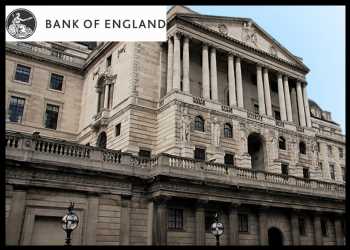Bank Of England Sees Inflation Exceeding 3% Temporarily

The Bank of England expects inflation to exceed 3 percent temporarily, and to fall back once the impact of rising commodity prices prove transitory.
At the Monetary Policy Committee meeting on Thursday, policymakers repeated their forward guidance and kept the policy unchanged, as widely expected.
The MPC said it did not intend to tighten monetary policy at least until there was clear evidence that significant progress was being made in eliminating spare capacity and achieving the 2 percent inflation target sustainably.
Policymakers maintained the key interest rate at an all-time low of 0.1 percent.
They also retained the existing stock of corporate bond purchases at GBP 20 billion and that of the government bond purchases at GBP 875 billion, taking the size of total quantitative easing to GBP 895 billion.
Citing a rapidly improving economic outlook and the rising cost pressure, BoE Chief Economist Andrew Haldane voted against the proposition to retain the size of government bond purchases.
At his final MPC meeting, Haldane sought to reduce the size to GBP 825 billion from GBP 875 billion. He had voted for a similar reduction at the May meeting.
Other than the MPC noting the growing upside risks to inflation alongside the latest policy decision, there were no real signs that it is thinking about tightening policy sooner, à la the Fed, Capital Economics economist Paul Dales said.
The economist expects the policy to be tightened much later than the mid-2022 date the markets have assumed.
The central bank expects the economy to experience a temporary period of strong GDP growth and above-target CPI inflation, after which growth and inflation will fall back.
Consumer price inflation exceeded the 2 percent target in May.
“CPI inflation is expected to pick up further above the target, owing primarily to developments in energy and other commodity prices, and is likely to exceed 3 percent for a temporary period,” the bank said.
The MPC expects the direct impact of rises in commodity prices on CPI inflation to be transitory. Nonetheless, the near-term upward pressure on prices could prove somewhat larger than expected.
The bank raised its GDP growth forecast for the second quarter to 5.50 percent from 4.25 percent in the May report. Output in June is projected to be around 2.50 percent lower than in the fourth quarter of 2019.
Source: Read Full Article
